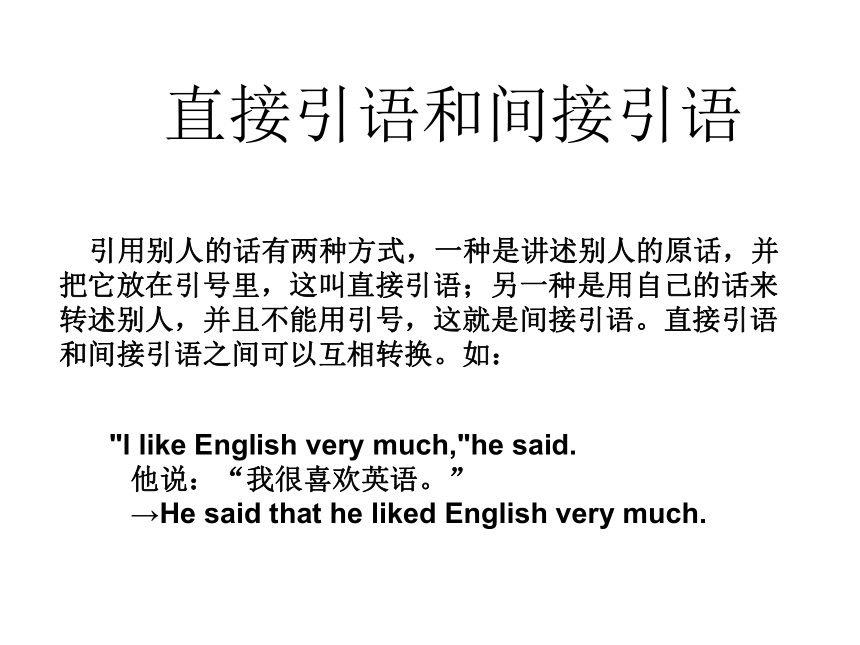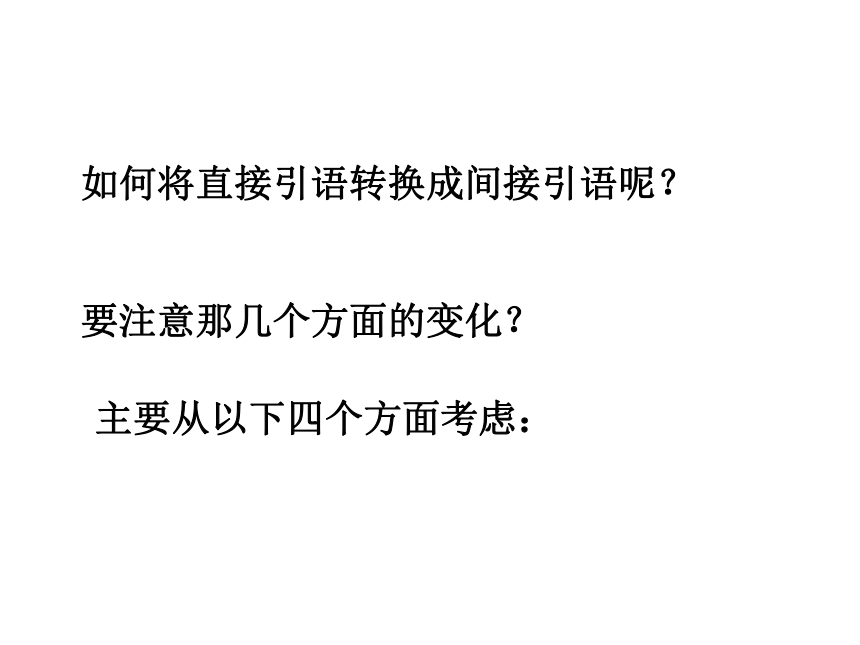Unit 2 English around the world Grammar 课件(人教版必修1)
文档属性
| 名称 | Unit 2 English around the world Grammar 课件(人教版必修1) |

|
|
| 格式 | rar | ||
| 文件大小 | 157.7KB | ||
| 资源类型 | 教案 | ||
| 版本资源 | 人教版(新课程标准) | ||
| 科目 | 英语 | ||
| 更新时间 | 2011-10-12 00:00:00 | ||
图片预览









文档简介
(共21张PPT)
直接引语和间接引语
Unit2
English around the world
Grammar:
引用别人的话有两种方式,一种是讲述别人的原话,并把它放在引号里,这叫直接引语;另一种是用自己的话来转述别人,并且不能用引号,这就是间接引语。直接引语和间接引语之间可以互相转换。如:
"l like English very much,"he said.
他说:“我很喜欢英语。”
→He said that he liked English very much.
直接引语和间接引语
如何将直接引语转换成间接引语呢?
要注意那几个方面的变化?
主要从以下四个方面考虑:
一. 人称的变化
二.时态的变化
三.指示代词, 时间状语,地点状语,特定动词的变化
四. 特定情况
He said, “I like it very much.”
He said that he liked it very much.
He said to me, “I’ve left my book in your room.
He told me that he had left his book in my room.
人称的变化
I said to her, “I have done my best.”
I told her that I had done my best.
时态的变化
2.一般地,主句谓语动词为一般过去时时,从句时态推移到过去的相应时态。(过去完成时,过去将来时,过去进行时,及一些特例除外)。
1.主句谓语动词是一般现在时时,从句时态无需变化
He always says, “I am tired out.” ——>
He always says that he is tired out.
直引变间引时态变化 以work为例
直接引语 间接引语
一般现在时——一般过去时 works worked
现在进行时——过去进行时 Is working Was working
现在完成时——过去完成时 Have worked Had worked
一般过去时——过去完成时 worked Had worked
过去完成时不变 Had worked Had worked
一般将来时——过去将来时 Will work Would work
1. “I am very glad to visit your school”, she said.
—> She said she was very glad to visit our school.
2. Tom said, “We are listening to the pop music.”
—> Tom said that they were listening to the pop music.
3. He said,” I have finished my homework”
—>He said that he had finished his homework.
4. They said, “ We saw her in the street”
—>They said that they had seen her in the street.
5.He said,” I had finished my homework before supper”
—>he said that he had finished his homework before supper.
6.Xiao Ming said,” I’ll do it after class”
—>Xiao Ming said that he would do it after class.
直接引语 间接引语
this that
these those
here there
come go
bring take
指示代词, 时间状语,地点状语,特定动词的变化
直接引语 间接引语
now then
today that day/yesterday/on Saturday, etc.
tomorrow the next day/the following day/on Tuesday, etc.
yesterday the day before/the previous day/on Tuesday, etc.
next week the week after/the following week, etc.
last year the year before/the previous year, etc.
a week ago a week before/a week earlier, etc.
2 She said, “I’ll come here again tonight.”
→ She said she would go there again that night.
1 He said, “I want this.”
→ He said that he wanted that.
3 May said to Tom, “I’ll bring some photos here to you tomorrow.” →
May told Tom she would take some photos there to him the next day.
特定情况
1, 如在当地转述,here不必改为there, 动词come 不必改为go, 如在当天转述,yesterday, tomorrow 等时间状语也不必改变。
2,在以下特定情况下,时态一般不作变化。
(1) 如果直接引语是表示客观真理时。如:
The teacher said "The earth goes around the sun."
→The teacher said that the earth goes around the sun.
(3直接引语中有明确表示过时间的状语时。
He said to me, "I was born in 1973."
→He told me that he was born in 1973.
(2)当直接引语表示为名人名言或谚语时.
The teacher told us, “ A friend in need is a friend indeed”
→ The teacher told us that a friend in need is a friend indeed.
(5)直接引语是过去进行时,时态不变。如:
Jack said. "John, where were you going when I met you in the street “
→Jack asked John where he was going when he met him in the street。
(4) 直接引语所述事实现在仍然存在,仍是现在反复出现或习惯的动作。
He said, "I’m a boy, not a girl."
→He said that he is a boy ,not a girl.
The girl said, "I get up at six every morning."
→The girl said that she gets up at six every morning.
He said to the doctor, “I smoke two packs every day.”
→ He told the doctor that he smokes two packs every day.
(7)如果直接引语中含有情态动词 must, had better以及情态动词的过去式could, might, should, would,在变为间接引语时,这些情态动词没有时态的改变。例如:
The teacher said to me . "You must pay more attention to it."
→The teacher told me that I must pay more attention to it.
The doctor said, “You'd better drink plenty of water.”
—> The doctor said I'd better drink plenty of water.
He said, “She must be a teacher.”
—> He said that she must be a teacher.
He said, “She ought to have arrived her office by now.”
—> He said that she ought to have arrived her office by then.
6)当直接引语中有以when, while引导的从句,表示过去的时间时,如:
He said,“When I was a child, I usually played football after school.”
——> He said that when he was a child, he usually played football after school.
一 直接引语为陈述句时,间接引语应改为由that引导的宾语从句
各类句型下的转化
She said, "Our bus will arrive in five minutes.“
→She said that their bus would arrive in five minutes.
The teacher said "The earth goes round the sun."
→The teacher said that the earth goes round the sun.
Tom said, “We are listening to the pop music.”
—> Tom said that they were listening to the pop music.
直接引语为一般疑问句时,间接引语应改为由 whether或if引导的宾语从句,谓语动词若为say,said,要改为ask, asked.如:
He said, "Can you swim, John "
→He asked John whether / if he could swim.
" Have you finished the homework " my mother asked.
→My mother asked me whether/if I had finished the homework.
三 直接引语如果是特殊问句,转化后的宾语从句仍然用原来的疑问词引导。(宾语从句要用陈述句语序)。
She asked me, "When do they have their dinner “
→ She asked me when they had their dinner.
He asked me, “ What do you want ”
→ He asked me what I wanted.
She asked me, "When do they have their dinner “
→ She asked me when they had their dinner.
直接引语为祈使句
祈使句表示命令、要求、请求的。转述这类祈使句时,要将祈使句的动词原形变为带to的不定式,并在不定式的前面根据句子的意思加上tell, ask, order等动词。如果祈使句为否定式,在不定式的前 面加not。
ask/tell sb. to do sth.
ask/tell sb. not to do sth。如:
The hostess said to us, “Please sit down.”
→ The hostess asked us to sit down.
.
"Don’t make any noise," she said to the children.
→She told (ordered) the children not to make any noise.
"Bring me a cup of tea, please," said she.
→She asked him to bring her a cup of tea.
3. 直接引语是表示建议的祈使句的变动。
He said, “Let’s go to the cinema.”
He suggested going to the cinema.
He suggested that we should go to the
cinema.
suggest doing sth.
suggest that sb. should do (动词原形) sth.
suggest后面不能用不定式suggest to do
sth.
直接引语和间接引语
Unit2
English around the world
Grammar:
引用别人的话有两种方式,一种是讲述别人的原话,并把它放在引号里,这叫直接引语;另一种是用自己的话来转述别人,并且不能用引号,这就是间接引语。直接引语和间接引语之间可以互相转换。如:
"l like English very much,"he said.
他说:“我很喜欢英语。”
→He said that he liked English very much.
直接引语和间接引语
如何将直接引语转换成间接引语呢?
要注意那几个方面的变化?
主要从以下四个方面考虑:
一. 人称的变化
二.时态的变化
三.指示代词, 时间状语,地点状语,特定动词的变化
四. 特定情况
He said, “I like it very much.”
He said that he liked it very much.
He said to me, “I’ve left my book in your room.
He told me that he had left his book in my room.
人称的变化
I said to her, “I have done my best.”
I told her that I had done my best.
时态的变化
2.一般地,主句谓语动词为一般过去时时,从句时态推移到过去的相应时态。(过去完成时,过去将来时,过去进行时,及一些特例除外)。
1.主句谓语动词是一般现在时时,从句时态无需变化
He always says, “I am tired out.” ——>
He always says that he is tired out.
直引变间引时态变化 以work为例
直接引语 间接引语
一般现在时——一般过去时 works worked
现在进行时——过去进行时 Is working Was working
现在完成时——过去完成时 Have worked Had worked
一般过去时——过去完成时 worked Had worked
过去完成时不变 Had worked Had worked
一般将来时——过去将来时 Will work Would work
1. “I am very glad to visit your school”, she said.
—> She said she was very glad to visit our school.
2. Tom said, “We are listening to the pop music.”
—> Tom said that they were listening to the pop music.
3. He said,” I have finished my homework”
—>He said that he had finished his homework.
4. They said, “ We saw her in the street”
—>They said that they had seen her in the street.
5.He said,” I had finished my homework before supper”
—>he said that he had finished his homework before supper.
6.Xiao Ming said,” I’ll do it after class”
—>Xiao Ming said that he would do it after class.
直接引语 间接引语
this that
these those
here there
come go
bring take
指示代词, 时间状语,地点状语,特定动词的变化
直接引语 间接引语
now then
today that day/yesterday/on Saturday, etc.
tomorrow the next day/the following day/on Tuesday, etc.
yesterday the day before/the previous day/on Tuesday, etc.
next week the week after/the following week, etc.
last year the year before/the previous year, etc.
a week ago a week before/a week earlier, etc.
2 She said, “I’ll come here again tonight.”
→ She said she would go there again that night.
1 He said, “I want this.”
→ He said that he wanted that.
3 May said to Tom, “I’ll bring some photos here to you tomorrow.” →
May told Tom she would take some photos there to him the next day.
特定情况
1, 如在当地转述,here不必改为there, 动词come 不必改为go, 如在当天转述,yesterday, tomorrow 等时间状语也不必改变。
2,在以下特定情况下,时态一般不作变化。
(1) 如果直接引语是表示客观真理时。如:
The teacher said "The earth goes around the sun."
→The teacher said that the earth goes around the sun.
(3直接引语中有明确表示过时间的状语时。
He said to me, "I was born in 1973."
→He told me that he was born in 1973.
(2)当直接引语表示为名人名言或谚语时.
The teacher told us, “ A friend in need is a friend indeed”
→ The teacher told us that a friend in need is a friend indeed.
(5)直接引语是过去进行时,时态不变。如:
Jack said. "John, where were you going when I met you in the street “
→Jack asked John where he was going when he met him in the street。
(4) 直接引语所述事实现在仍然存在,仍是现在反复出现或习惯的动作。
He said, "I’m a boy, not a girl."
→He said that he is a boy ,not a girl.
The girl said, "I get up at six every morning."
→The girl said that she gets up at six every morning.
He said to the doctor, “I smoke two packs every day.”
→ He told the doctor that he smokes two packs every day.
(7)如果直接引语中含有情态动词 must, had better以及情态动词的过去式could, might, should, would,在变为间接引语时,这些情态动词没有时态的改变。例如:
The teacher said to me . "You must pay more attention to it."
→The teacher told me that I must pay more attention to it.
The doctor said, “You'd better drink plenty of water.”
—> The doctor said I'd better drink plenty of water.
He said, “She must be a teacher.”
—> He said that she must be a teacher.
He said, “She ought to have arrived her office by now.”
—> He said that she ought to have arrived her office by then.
6)当直接引语中有以when, while引导的从句,表示过去的时间时,如:
He said,“When I was a child, I usually played football after school.”
——> He said that when he was a child, he usually played football after school.
一 直接引语为陈述句时,间接引语应改为由that引导的宾语从句
各类句型下的转化
She said, "Our bus will arrive in five minutes.“
→She said that their bus would arrive in five minutes.
The teacher said "The earth goes round the sun."
→The teacher said that the earth goes round the sun.
Tom said, “We are listening to the pop music.”
—> Tom said that they were listening to the pop music.
直接引语为一般疑问句时,间接引语应改为由 whether或if引导的宾语从句,谓语动词若为say,said,要改为ask, asked.如:
He said, "Can you swim, John "
→He asked John whether / if he could swim.
" Have you finished the homework " my mother asked.
→My mother asked me whether/if I had finished the homework.
三 直接引语如果是特殊问句,转化后的宾语从句仍然用原来的疑问词引导。(宾语从句要用陈述句语序)。
She asked me, "When do they have their dinner “
→ She asked me when they had their dinner.
He asked me, “ What do you want ”
→ He asked me what I wanted.
She asked me, "When do they have their dinner “
→ She asked me when they had their dinner.
直接引语为祈使句
祈使句表示命令、要求、请求的。转述这类祈使句时,要将祈使句的动词原形变为带to的不定式,并在不定式的前面根据句子的意思加上tell, ask, order等动词。如果祈使句为否定式,在不定式的前 面加not。
ask/tell sb. to do sth.
ask/tell sb. not to do sth。如:
The hostess said to us, “Please sit down.”
→ The hostess asked us to sit down.
.
"Don’t make any noise," she said to the children.
→She told (ordered) the children not to make any noise.
"Bring me a cup of tea, please," said she.
→She asked him to bring her a cup of tea.
3. 直接引语是表示建议的祈使句的变动。
He said, “Let’s go to the cinema.”
He suggested going to the cinema.
He suggested that we should go to the
cinema.
suggest doing sth.
suggest that sb. should do (动词原形) sth.
suggest后面不能用不定式suggest to do
sth.
